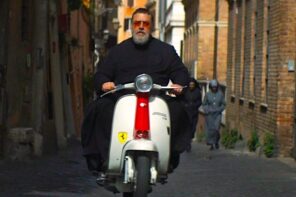If sexual abuse evokes religion for all the wrong reasons, it also the kind of horror that still turns many people to prayer. On Saturday, when the Penn State football team took the field for the first time since the scandal broke—and since their iconic coach, Joe Paterno, was fired along with University President Graham Spanier—Nebraska and Penn State players met on the field for a very public prayer of healing and justice.
The sight of athletes huddled in humility in the face of what is now a national crisis moved many in the stands to tears before a prayerful word had even been uttered. More than one hundred thousand fans grew briefly silent as Nebraska’s Assistant Coach Ron Brown, an evangelical who often leads prayers before games, but never before such a large audience, prayed with the aggressive cadence of a preacher trying to exorcise demons. Every word seemed a defiant strike against the shame, abuse, and evil of this scandal: “May the truth be known, may justice be known, may You protect the victims!” Ron Brown seemed poised for this moment, prepared to lead an evangelical assault against moral turpitude and to champion grace and healing in the process.
“There are a lot of little boys watching this game”
Brown’s prayer could not be heard in the stands, but the AP picked up both the visuals and audio of the prayer, and the video is now making rounds. Likewise, the prayer has been the subject of article headlines about the game. Many called it a “touching moment.” In the past, though, Brown’s faith has come under more negative scrutiny. He claims to have been passed up for a head coaching job at Stanford University because he, like many conservative evangelicals, believes that gay sex is sinful.
In his prayers at Penn State, Brown did not mention sexuality; he was railing against sexual abuse. Nevertheless, besides the weighty matters of truth, justice, and protection, Brown prayed for something much less obviously connected to the alleged sexual abuse: a restoration of masculinity to the game of football:
“There are a lot of little boys around the country, today, who are watching this game. And they’re trying to figure out what the definition of manhood is all about. Father, this is it right here. I pray that this game will be a training ground of what manhood looks like.”
When I heard that prayer I couldn’t help but ask, why here and why now? What is it exactly about this scandal that relates to little boys trying to learn what manhood looks like?
John Sandusky is an older man who used his prestige and power to abuse boys. Perhaps, then, Brown’s prayer about a redemptive display of masculinity merely reinforces a truism: that decent men would never abuse anyone. Since lines were transgressed in obviously horrific ways perhaps the boundaries of decency need to be reinforced in just as obvious a fashion. This still raises other questions, though: Who gets to re-draw these borders at such a sensitive time of (national) crisis? Also, what will young boys learn about gender from the dominant religious portrayals of manhood in muscular Christianity?
Muscular Christianity refers to the wedding of traditional conceptions of masculinity—such as bravery, chivalry, and athleticism—with evangelical Christian emphases on personal conversion and biblical devotion. Tim Tebow is perhaps the quintessential muscular Christian, combining religious and athletic vigor on the most visible athletic platform in the country: the National Football League.
Muscular Christianity is also developed in more pedestrian venues, on college campuses among groups such as the Fellowship for Christian Athletes. Evangelicals espousing some form of muscular Christianity (not a term that most would use) tend to interpret the Bible conservatively—especially with regards to sexual norms. Gay sex among consenting adults, for example, is usually labeled sinful in such evangelical contexts. There are few if any progressive religious voices in these settings.
If young boys are looking to college football to learn what manhood looks like, will they find any examples of gay men who are out and proud? There are none making headlines at the moment, but athletes at other levels and in other sports have taken brave steps. John Amaechi played basketball at Penn State in the early 1990s before joining the NBA. After retiring, he became the first NBA player, past or present, to come out; an admission which spurred death threats against him. One wonders whether a man who stands up to such opposition with clarity, courage, and composure will be considered a model of masculinity by young boys watching sports.
On Friday, Major League soccer player David Testo revealed that he was gay in a French-language radio interview in Canada. All his teammates knew about his orientation, and according to Testo they were supportive. To my knowledge, though, there have still not been any gay players who have used progressive or liberal religious terms when coming out.
If the only religious voices heard on the fields are the most conservative on issues of human sexuality, there may be few opportunities for athletes to combine vigorous athleticism, strong religious commitment, and fidelity to LGBT identities in the same breath.
At the very least, when religion, sports, and gender take the national center stage it is not insignificant that evangelical Christians increasingly play such a public—and nearly exclusive—role in championing particular conceptions of “manhood.”




